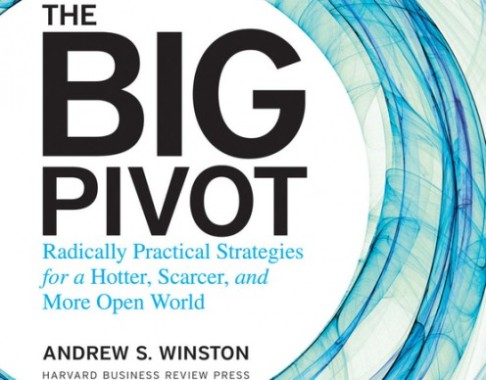By: Nathan Sell*
What does it mean to live in a world that is hotter, scarcer and more open? Andrew Winston, business sustainability guru, debuts his follow up work to “Green to Gold.” “The Big Pivot” looks at what it means to live in a world ravaged by unpredictable weather patterns, scarcity of precious resources, and openness of information that comes with living in the world of today and tomorrow. Most importantly, Winston examines how businesses must react (or pivot) for survival. Sustainability has slowly been gaining ground in business, but it can no longer be a “buzz word,” but rather a piece of day-to-day operations and decision making in every company and business.
There’s quite literally a storm brewing, as Hurricane Sandy, and numerous other disasters have proven in recent years. Climate Change is not an event that will happen one day, it is happening now. The demands of seven billion inhabitants on this planet is showing in nearly every way, from resource use and carbon emissions, to water and food scarcity. We’ll reach the nine billion mark somewhere around 2050. Not only will there be nine billion people, but the emerging global middle class means that those nine billion people will be more demanding on the earth’s resources than ever before. To sustain the human race “The Big Pivot” must take place.
While sustainability, social responsibility and environmental programs have long formed niche departments in a variety of businesses, Winston identifies the “Pivot” as moving these “niche” departments into leading roles. Businesses operate within the confines of our planet’s resources. The sooner environment and sustainability are the main informants in decision making, the sooner we can hope to operate within the limits that exist, yielding a zero footprint or even restorative change.
Many “early movers” in the sustainability realm are reaping the benefits of sustainable operations. By dismissing the notion of operating on a quarter-by-quarter basis, but looking to long-term sustainable investment as a means of ensuring longevity and continued growth, these companies are leading industries in both sustainability and sales. Some of these forward thinking companies include IGEL Corporate Advisory Board members such as Dow, Johnson & Johnson, Xerox and GE to name a few.
Winston reminds us that when taking action to enhance business in a hotter, scarcer and more open world, the first step is goal setting. These goals must be informed by science. If we hope to live in a world with no more than a 2 degree Celsius rise in temperature, emissions must be curbed 80% by 2050. It is clear that working in the confines of “what we think we can do” is no longer acceptable. Aggressive, process altering goals must be set, and these goals must align to the 2050 benchmark or they are too little too late. The proof is out there, as outlined in Winston’s writing, that not only do these reductions yield environmental benefits but profits as well. Evaluating how your company can help to reach this 2050 target can be daunting but the tools available at pivotgoals.com can help to guide change. Still unsure that your business can benefit from “The Big Pivot?” Get your copy, available on Amazon.
*Nathan Sell is a recent graduate of the Master of Environmental Studies program at the University of Pennsylvania, and is the current IGEL Coordinator.



 William McDonough at the Sustainable Brands Conference “From Revolution to Renaissance” in San Diego (Courtesy of Sustainable Brands)
William McDonough at the Sustainable Brands Conference “From Revolution to Renaissance” in San Diego (Courtesy of Sustainable Brands)


